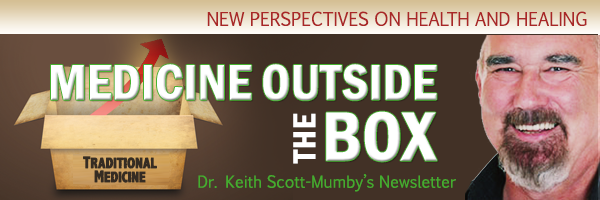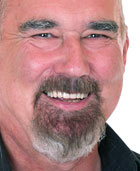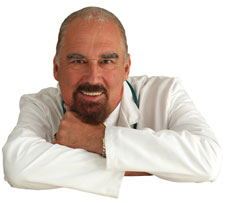
Engine Speed. The Thyroid Gland.The big dividing line in healing philosophy between staid conventional colleagues and doctors like myself, is that we believe the patient more than they believe laboratory tests. If there is a conflict, we assume the patient is a more accurate monitor of disease than blood tests. I mean, how crazy is it to state to a patient (happens often) that, “We have done all the tests and there is nothing wrong,” when the patient says she feels awful? Take the treatment and investigation of thyroid disease as an example. octors who don't think for themselves, but rely solely on the blood tests, will ignore striking symptoms such as fatigue, depression, sensitivity to cold, weight-gain, dry skin, hair loss in a middle-aged or older person, if the thyroid markers are "normal". Good holistic doctors will follow the symptoms and treat the clinical condition, which clearly exists. The fact is that up to 20% of the population is probably suffering from some degree of hypothyroidism (low thyroid function), though in some territories it could be much higher. The opposite - hyperthyroidism, or overactivity of the gland - is actually relatively rare. The older you get, the more prone you are to the condition; it's part of natural ageing. But it is still pathological and it should be treated! Part of the problem is that the tests are pretty crude and disease has to become seriously in degree before it shows up as altered blood levels. Also the usually quoted range is so wide it is relatively meaningless and you could be 50% down on "average" and still said to be within normal limits. The real point is that a person can be functionally hypothyroid without any other abnormal markers than symptoms and signs of disease. It's a test of a doctor's skill to recognize and treat the disease they see, whether or not the laboratory is helpful in confirming the diagnosis. It is vital that all doctors start to think more often of thyroid problems. Because it's not just a "quality of life" issue: your risk of heart disease is significantly increased and the confusion and lethargy which comes on may even be mistaken for senility and the patient put on a completely inappropriate program. Immunity What very few doctors seem to know is that the thyroid gland is wrapped up in the process of immunity. Several studies have shown that a patient with thyroid problems is more likely to develop cancer (cancer is best considered a disease of the immune system). This doesn't mean only thyroid cancer - any cancer could be involved! I first came across the connection between thyroid and immunity in my work as an allergy guru. Time and again patients would present the symptoms of thyroid disease, along with their allergy problems. This was especially true of women and there is a very good reason. Women have a high incidence of a clinical condition called Hashimoto's disease (auto-immune thyroiditis), in which the body makes antibodies against the thyroid gland and hormones. It's one of those allergy-against-yourself diseases (rheumatoid arthritis is another). It must be mentioned in passing that there is another kind of thyroiditis. This is not caused by anti-bodies but a virus, typically mumps or Coxsackie. Usually it resolves clinically but may be the source of chronic hypothyroidism. Pioneer the late Dr Broda O. Barnes reckoned that hypothyroidism underpinned a huge range of diseases in the West, from heart disease, to allergies; cancer to apparent parasitism; loss of sexual function to visual acuity. Notice, by the way, how those are like a catalogue of aging problems! But it’s not just about pseudo-aging: for women, all kinds of menstrual difficulties—notably heavy flow—can be attributed to hypothyroidism, as can emotional and behavior problems in children. Indeed, there is a clear link between hypothyroidism and autism spectrum disorder. Accelerating Problem What’s worrying is the theory that thyroid disorders are getting worse with every generation. One of the important reasons for such widespread hypothyroid problems in Western civilization is the fact that it is in large part due to the toxic overload that we all bear. Nothing suffers quite so much as the thyroid gland from loading with pesticides, pollutants and toxic heavy metals. With each generation, the toxic overload accumulates steadily, much like chemicals accumulate moving up the food chain (remember, we are at the top of many food chains). But the thyroid dysfunction multiples too; each parent generation starting their kids off with an already compromised organ, who pass it on to their kids, even more disadvantaged still—and so it goes on. If this is true, we would be facing thyroid misery of almost epidemic proportions. And you know what? That’s exactly what we are seeing. But the medical profession is not getting it—because they rely entirely on stupid and unworkable test; nothing shows, so there is “no problem”. The Broda Barnes Temperature Test Blood tests for thyroid hormones are totally unreliable; a patient may have normal thyroid hormone levels but, if the body is not responding to those hormones, a deficiency equivalent is the result. A simple test for thyroid function which is very helpful is to take regular measurements of basal temperature - the so-called Broda Barnes test, named after the doctor who first wrote about it. Basal temperature means while at absolute rest. In ordinary terms that means first thing on waking, after the body has been lying still overnight. Temperature drops to its lowest at this point. To measure your own basal temperature, use a clinical thermometer, keep it under your tongue, before getting out of bed or any activity whatsoever, for at least three minutes without opening your mouth. Record the results. Generally, if it is running at 36.50 C (97.50 F) or less, that is presumptive evidence of low thyroid function. Allowance may need to be made for women who are ovulating, since the temperature naturally rises about 0.5 of a degree at this time. I will help the patient interpret what is found. Other Tests Bio-energetic testing, such as electro-acupuncture, may be yet another route by which poor thyroid function is called to the attention of the physician. All very controversial. But fortunately the new magic of electronic bio-energetic testing (see my latest book VIRTUAL MEDICINE from Thorsons) also often shows us effective herbal, homeopathic and other holistic remedies which will work in the presence Treatment I my practice I use a several-fold approach. The simplest, if the signs are early enough and the patient is otherwise vigorous, is homeopathic thyroid stimulant. I use a product called Thyroidea compositum from Germany. It is one of the most powerful and useful non-drug substances I have in my repertoire. Such is its impact on immunity I find myself prescribing it often for my cancer patients seeking alternative remedies. If a trial of this substance and related compounds appears ineffective, then supplementation with the hormone can be considered. Conventional colleagues would not normally approach things this way, feeling that if the blood levels are adequate then supplementation is pointless. The stupidity of this attitude is that they then have nothing to offer the patient, beyond palliative treatment. Often this means prescribing anti-depressants for the lethargy and giving him or her a good ticking off about being overweight! Synthetic vs. Natural Replacement The usual thyroid hormone (levothyroxine) is synthetically produced. There are sometimes considerations that make the natural product better. This means supplementing dried thyroid extract from animal sources (pig instead of beef, because of BSE). But if Hashimoto's disease is the problem, synthetic products may be better, because the body doesn't react to them in the same way. But best I found was desiccated thyroid extract by Armour. Desiccated (dried) thyroid is a thyroid hormone replacement drug, prepared from the thyroid gland from pigs -- also known as "porcine thyroid." Other brand names include Nature-throid, and Westhroid. It has been on the market and safely used for more than 100 years. When synthetic thyroxine was introduced, there was a great deal of baloney and marketing hype about how modern it was, compared to "old-fashioned" desiccated thyroid -- and many doctors switched patients over to the synthetic medication. When the patient went into a steep decline as a result, he or she was told “It’s your age.” All along, Synthroid has been sponsor of medical meetings, golf outings, symposia, research grants, and speakers' fees, and is the chief provider of lunches at medical offices, patient literature, pens, pads, mugs, and other freebies, giveaways, and marketing items for decades. We now have several generations of doctors who have been trained to believe that synthetic levothyroxine -- and specifically Synthroid -- is the only thyroid replacement medication available or worth using. They simply don't know anything else. They hear ridiculous rumors on a regular basis -- spread by drug reps for competitive levothyroxine drugs -- that desiccated thyroid is going off the market. Pseudo-Science Most doctors claim their opposition to desiccated thyroid is science-based. However, that’s not true, because there are no double-blind, peer-reviewed, double-blind studies that compare levothyroxine to desiccated thyroid in terms of effectiveness at resolving patient symptoms. So despite orthodox claims to rely on science, the fact is, the science doesn't exist to bolster the arguments that levothyroxine is superior to desiccated thyroid in resolving symptoms. But things have got worse: much worse. Today, the profession has such an obsession with blood tests and lab work—and such a total belief in their accuracy and supremacy, that it has become considered quackery to ignore them. A doctor who administers thyroid supplements to a patient, when the blood tests are “normal” faces censure and loss of the right to practice medicine. To treat a patient properly with clinical severe hypothyroidism may be as much as a physician’s license is worth. To diagnose by the signs of the disease (the only reliable diagnostic method) is a lost art and patients face having it put down to aging and inadequacy. Some patients are even taken off thyroid replacement therapy because they “don’t need it any more”; the blood tests have normalized. So the poor patient’s worthwhile life is ended, crucified on the cross of stupid and ignorant dogma. He or she declines in energy, looks, vitality, joy and sexuality. Weight gain is relentless; cholesterol soars; a heart attack becomes almost inevitable. The trouble is that patients who are hypothyroid every often have normal levels of thyroid hormones, such as T4, T3 and the infamous TSH. The latter is taken as the absolute benchmark of thyroid performance. If it is normal, you don’t have hypothyroidism. Yet this situation (which is very common indeed) has parallels with diabetes type II, in which there is plenty of insulin—actually an excess—yet the body is not responding to it. What difference does it make if the body’s thyroid hormone levels are “normal”, if the cells in the tissues cannot respond to it?
Suppliers You’ll see Armour by Forest Labs, the oldest on the market, then Naturethroid and Westhroid which came into the picture in the late 1930′s–by RLC Labs. It is always wise to start on a smaller dose of desiccated thyroid than they will ultimately need, such as 1 grain (60 mg). This will help the body get and there may be other issues which can reveal themselves, such as sluggish adrenals or low Ferritin/iron levels. But you will need to raise the dose quite soon, otherwise hypothyroid symptoms can return, due to the internal feedback loop in your body, which can happen if you stay on a low dose too long. Go to 2 grains in 2 – 3 weeks. Then 3 grains for a further 4 weeks, to give the T4 time to build (which can take 4-6 weeks). It’s unlikely indeed that anyone would need more than 5 grains. You can just swallow the grains or take them sublingually. When taking desiccated thyroid extract, it is important to avoid iron, estrogen and calcium supplements at the same time, since all bind the thyroid hormones to some degree. Iron is important in this context: having low iron levels decreases deiodinase activity, i.e. it slows down the conversion of T4 to T3. Biologically, insufficient iron levels may be affecting the first two of three steps of thyroid hormone synthesis by reducing the activity of the enzyme “thyroid peroxidase”, which is dependent on iron. Thyroid peroxidaxe brings about the chemical reactions of adding iodine to tyrosine (amino acid), which then produces T4 and T3. Insufficient iron levels alter and reduces the conversion of T4 to T3, besides binding T3. Additionally, low iron levels can increase circulating concentrations of TSH (thyroid stimulating hormone). You are looking for the removal of your hypothyroid symptoms, an afternoon temp of 98.6, a morning before-rising temp of 97.8 – 98.2 (held under arm ten minutes), good heart rate and blood pressure, good energy, clearing of brain fog, etc. We also found out that when optimal, our free T3 is at the top of the range, and free T4 is midrange. Note: if your free T3 is at the top of the range and you still feel horrible, time to test your iron (with blood) and cortisol levels (via saliva, NOT blood). Problems with either will cause T3 to pool high in your blood and not your cells. Warning: This is not really a go-it-alone area for self-help. You need your blood levels monitored. Thyroid hormone is potentially harmful, even dangerous, and you would be wise to seek out a qualified medical practitioner of the open-minded sort, who can help and steer you. Good website for self-help information and notes: www.stopthethyroidmadness.com, run by Janie Bowthorpe. She knows more than me! (She should, she suffered thyroid Hell herself and has made a career out of learning the full thyroid story). Disclaimer All content within this information letter is commentary or opinion and is protected under Free Speech laws in all the civilized world. The information herein is provided for educational and entertainment purposes only. It is not intended as a substitute for professional advice of any kind. In no event shall Professor Scott-Mumby be liable for any consequential damages arising out of any use of, or reliance on any content or materials contained herein, neither shall Professor Scott-Mumby be liable for any content of any external internet sites listed and services listed. Always consult your own licensed medical practitioner if you are in any way concerned about your health. You must satisfy yourself of the validity of the professional qualifications of any health care provider you contact as a result of this newsletter. |

